| Reviews & Columns |
|
Reviews DVD TV on DVD Blu-ray 4K UHD International DVDs In Theaters Reviews by Studio Video Games Features Collector Series DVDs Easter Egg Database Interviews DVD Talk Radio Feature Articles Columns Anime Talk DVD Savant Horror DVDs The M.O.D. Squad Art House HD Talk Silent DVD
|
DVD Talk Forum |
|
|
| Resources |
|
DVD Price Search Customer Service #'s RCE Info Links |
|
Columns
|
|
|
Face to Face
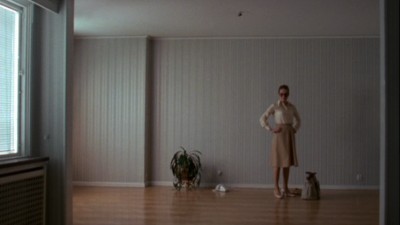
Despite the whole world having seen Annie Hall and Alvy Singer select it as their top movie-date choice* (with The Sorrow and the Pity running a distant second), Ingmar Bergman's 1976 film Face to Face is something of a lost work; it has until now never been available on any home-media format in the U.S, even though Bergman and star Liv Ullmann were nominated that year for, respectively, best director and best actress Oscars. But it is almost always worth the wait to add another Bergman achievement to the many already lining our DVD shelves, and, though Cries and Whispers is probably rightly regarded as the pinnacle of Bergman's 1970s output, Face to Face stands alongside (and even has some themes in common with) 1978's Autumn Sonata, another long-neglected Bergman work that was a revelation when finally released to disc a few years back.
Like Autumn Sonata, which also starred Ullmann, Face to Face is the story of a wrenching, long-delayed, but inevitable emotional day of reckoning. Jenny (Ullmann) is a successful psychiatrist whose surface demeanor is calm, even placid, and who seems quite happy with her family, her work, and her life. But there are niggling dissatisfactions. She and her husband are drifting through the ennui of an upper-middle-class European marriage (both are dedicated, educated, confident professionals married to their work; both take it for granted that the other has extramarital lovers), and her daughter, Anna, is well into adolescence, independent, and growing away from her parents. This is Jenny's situation as efficiently summarized in the first few scenes; we do not even see her husband or child until much later, and then only briefly, and we get the sense that this is a family of agreeable, disconnected strangers. Jenny appears to be sleepwalking through her life, not entirely present, and we soon see that she has unconsciously and self-protectively slipped into this numbed existence to avoid the long-suppressed, frighteningly extreme feelings and fears she has roiling inside her.
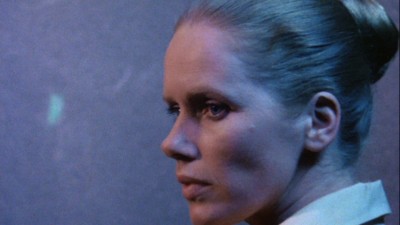
Most of the film's events occur while Jenny's husband and daughter are out of town (business, summer camp) over a summer month. Jenny is going back to the home of her grandparents, who brought her up after the death of her parents; she will temporarily live with them once again as she finalizes the arrangements for moving her family into their new house. But this brief, convenient return to her childhood environment--her past--is Jenny's first step into a sort of emotional isolation chamber in which she will be faced with all that she has buried, a confrontation seemingly presaged by the presence in her grandparents' apartment building of an old, mysterious woman who, in passing, returns Jenny's gaze with one normal eye and, in the place of the other, a dilated, pitch-black pupil, an all-seeing and completely impassive pool glaring out menacingly at Jenny.
This ominous brush with the unsettling neighbor woman is only the first of several troubling run-ins and outright traumas Jenny will face as she slowly breaks down, with the lines dividing her unresolved-memory-haunted nightmares from her waking life beginning to blur. Another involves her struggle to treat a patient, Maria (Kari Sylwan), who is quite ill, perhaps even psychotic, but pities even so what she can see is Jenny's emotional deadness; Maria is emotionally raw, too open to every feeling--a negative mirror image of Jenny's overcontainment. Maria's lack of control over her life leads to circumstances that jeopardize Jenny's physical safety, in an episode to which her delayed reaction is yet another clue to her many protective, deadening layers of psychological insulation.
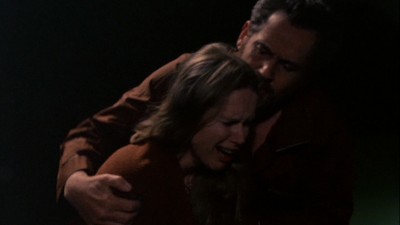
Running parallel to all of this is Jenny's lukewarm, dead-on-arrival physical relationship with a man she meets at a party, Tomas Jacobi (Erland Josephson, The Sacrifice), a divorced, bisexual doctor in the process of deciding whether he prefers romantic relationships with men or women. But what stalls physically may bloom emotionally, and her platonic friendship with the compassionate, open Tomas could be what prompts her into and carries her through the hellish abyss--her grief and anger toward her dead parents, her rage at the abuse and strictures she suffered as a child under her upstanding, well-meaning, but often cruel grandparents--she has shivered on the edge of for so long, and which she must traverse if she wishes to reach another side of life where she is capable of feeling and being present. As usual, Bergman leaves us without the certainty of "resolution," but he proffers the most subtle, delicate glimpse of hope; we can believe that at least one character will find a way to live their emotional life fully, unhindered by the traps we have seen Jenny attempt so desperately and movingly to claw her way out of.
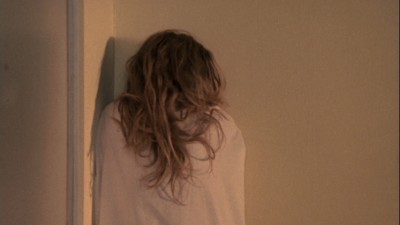
Ullmann is a deservedly legendary film actress, truly one of the best of all time (if you have not seen her breathtaking performances in Bergman's Persona or Cries and Whispers, both essential films at any rate, drop everything and do so at once), and with all due admiration for Erland Josephson's great-as-usual work in his supporting role, Face to Face is really her formidable challenge to meet alone as an actor, and she carries it off with the fully invested, almost frighteningly passionate aplomb for which she is renowned. The film's narrative movement is based on a progression, not of events, but of emotions--a quasi-musical structure for which Ullmann's visage is the instrument, she and Bergman the player. Her performance--which finds her fearlessly expressing virtually every possible emotion in the human range, from ice-cold to unbearably, tortuously inflamed and everything in between--would alone have rendered the film extraordinary. But her astonishing control (and instinct for when to lose control) of her facial expressions is married to perennial Bergman cinematographer Sven Nykvist's finesse with light, texture, and color to create some brilliant examples of what you could think of as the "Bergman close-up"--his trademark shot of an actor's face framed so unusually tightly, so intimately, and held for so long that it becomes almost unbearably intense; few others have even attempted it, as it requires the utmost skill, intelligence, and sensitivity to pull off. But we get the full effect of its sublimity time and again in this happily rediscovered film whose very title, rich with metaphorical meaning, also straightforwardly evokes its persistent fascination with the deceptively simple, endlessly changeable human face. The eyes--the face--are said to be the windows of the soul, and Face to Face affords us an astonishing, masterfully executed series of opportunities to look inside.
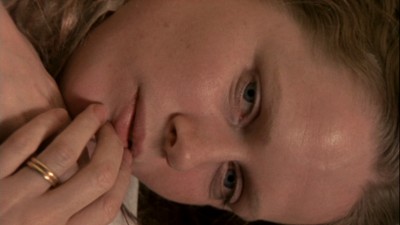
THE DVD:
The 1.78:1 transfer presented by Olive Films, known for their admirable mission of presenting hard-to-find, sometimes half-forgotten films like Face to Face to a new generation of DVD viewers, is fair to good. Using a print obtained from Paramount (which distributed Face to Face theatrically in the U.S. after it was shown, in a longer version, on Swedish television), Bergman's and cinematographer Sven Nykvist's compositions come through with most of their beautiful subtlety of light and color intact. There is some occasional flicker and grain, and perhaps the transfer overall could have been cleaned up a bit more to give us the full impact of the film's visual luminosity. Still, there is not too much to complain about on the visual level.
Sound:On the other hand, the sound on this edition of Face to Face is a problem verging on a sticking point. This is a film that has almost no music and is almost exclusively dialogue, so the sonic demands are not great, yet there isn't a moment free of low-level hiss and crackle on the Dolby digital mono 1.0 soundtrack, and all the actors' utterances seem to suffer distortion or feedback to one degree or another. It is not absolutely unlistenable (I once saw a beat-up old print of Cries and Whispers at a university repertory cinema with a primitive PA sound system, and the aural experience here is about on par with that), and one gets used to it over the course of the film. But sound quality this rough is an anachronism in the DVD age, and the feeling that Olive could have made more of an effort to get the sound up to snuff is unavoidable.
Extras:None.
FINAL THOUGHTS:Not even subpar sound can render Olive Films's at-long-last DVD release of Bergman's Face to Face anything less than a most welcome event. Bergman's well-known sensitivity to human anguish and longing, with all the conundrums and catastrophes they produce within and between us, is (with the inimitable and indispensable aid of cinematographer Sven Nykvist) put on nicely detailed display, and Ullmann's performance is flat-out great; the places she allows Bergman to take her and what she is able to achieve as she intricately and completely realizes Jenny's emotional journey are just exhilarating. She externalizes and lets us see what we might have thought could only be felt internally and subjectively. If Face to Face is not absolutely top-notch Bergman, that only means that with his greatest films, he was capable of successfully pulling off brilliant ideas few would dare even attempt (as in Persona), whereas his more minor works are "only"' somewhat less ambitious but still painstakingly conceived and executed works of art. Which is to say that Face to Face demonstrates, just as well as any of the other less-celebrated if more widely-known entries in Bergman's filmography (Hour of the Wolf, Sawdust and Tinsel, etc.), that his second tier is more deeply rewarding than what more average filmmakers offer us when they're at the top of their game. Highly Recommended.
*
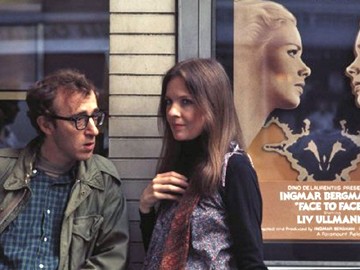
|
| Popular Reviews |
| Sponsored Links |
|
|
| Sponsored Links |
|
|
| Release List | Reviews | Shop | Newsletter | Forum | DVD Giveaways | Blu-Ray | Advertise |
|
Copyright 2024 DVDTalk.com All Rights Reserved. Legal Info, Privacy Policy, Terms of Use,
Manage Preferences,
Your Privacy Choices | |||||||














